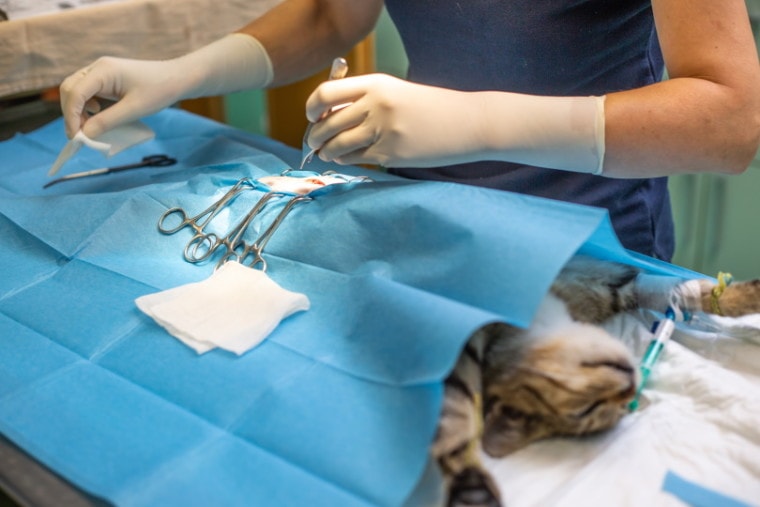
Cat overpopulation1 is a growing problem in the US. Outdoor cats not only present a conservation threat to local wildlife, but an intact male cat can breed and produce more feral populations at risk from disease, injury, hunger, thirst, fear, or pain.
Neutering your cat is the single best step you can take to protect not only your cat’s health and well-being but your community. This procedure is routine and carries minimal risk in exchange for wide-reaching benefits. Male cat neutering takes an average of 5-20 minutes and sometimes it can be performed in under 2 minutes1.
Cat Neuter Surgery
Neutering and castration are common terms to describe an orchiectomy2, the surgical removal of the testicles to sterilize a male cat.
For neutering, your cat will undergo general anesthesia. Your vet may pull bloodwork to check your cat’s organ function and ensure he’s healthy enough for anesthesia and surgery.
Your cat will be given a sedative to relax him prior to going to sleep. Once under, your vet will make an incision through the scrotum and remove the testicles. These incisions are very small, so they often are not sutured.
Your cat is then woken up and, barring complications, can return home the same day as the surgery. You may be given pain medication, an Elizabethan collar, and post-operative instructions.
Most cats can resume normal activity three to five days following surgery, but their activity should be restricted until then.
Benefits of Neutering a Cat
The biggest benefit of neutering a male cat—even an indoor one—is doing your part to prevent overpopulation. A neutered male can’t impregnate a female and can’t produce a litter. If everyone neutered their cats, we’d have fewer feral and stray litters.
Neutering also prevents some behavioral problems3, such as roaming to seek a mate or fighting with other cats for sexual competition or territory. Intact males may engage in other undesirable behaviors like urine marking and spraying, which are eliminated by neutering.
In addition, neutering a male cat eliminates the risk of testicular cancer4 and lowers the risk of other reproductive cancers or problems, such as prostate cancer and prostatitis.

Does Neutering Have Complications?
Neutering is a common surgery, and complications are rare, but they are possible. Your cat can experience complications related to anesthesia, such as an adverse reaction or possible death. These are extremely rare, however.
Cats may get a post-operative infection at the incision site, but it’s usually easy to treat with antibiotics. Typically, the signs and symptoms of an infection include redness, heat, swelling, odor, or discharge at the surgical site.
It’s important to follow the post-operative care instructions and prevent your cat from licking or biting his incision area. If you notice a problem, call your vet as soon as possible.
Will My Cat Get Fat?
Neutering will lower your cat’s metabolism and activity levels, which can cause him to put on weight more easily. Fortunately, you can control excessive weight gain with exercise and proper nutrition.
Conclusion
Neutering your cat comes with many benefits, not just for your cat but for your own comfort and the well-being of your community. This surgery is routine and simple—even compared to neutering dogs—and most cats make a full recovery to lead a long and happy life.
See also:
Featured Image Credit: Simon Kadula, Shutterstock








